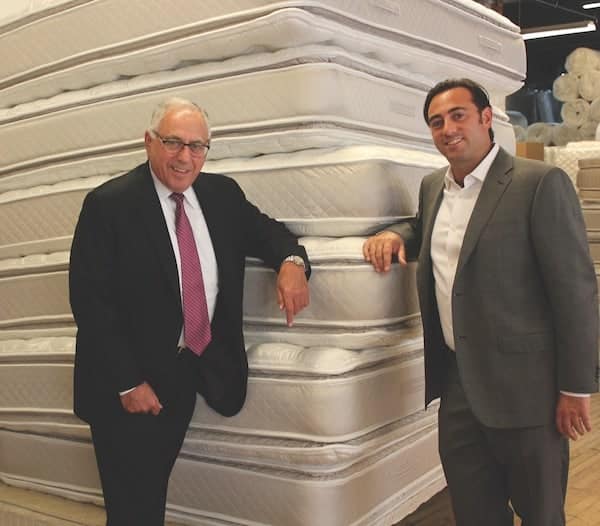
Shifman Mattress Co. is a family-owned business led by Mike Hammer (left), who serves as chief executive officer, and his son Bill, who is president.
Manufacturer expanding market for its handcrafted, luxury bed sets
For Bill Hammer, president of Shifman Mattress Co., running a company with a storied 126-year history presents two ongoing but very different challenges. First, there’s the necessity of protecting the legacy of quality and service at the foundation of the manufacturer’s success. Second, and equally important, is the need to develop innovative products and programs so the company can keep pace with a fast-changing marketplace to meet the evolving needs of its retailers and consumers.
As the youngest son of Mike Hammer, who led Shifman Mattress through a major restructuring after buying the struggling company in 1985, Bill Hammer knows the task of keeping a business relevant while staying true to its roots is never easy. But he’s excited about the company’s prospects for growth and he’s working hard with his father and the Shifman team on a variety of initiatives to strengthen its competitive position.
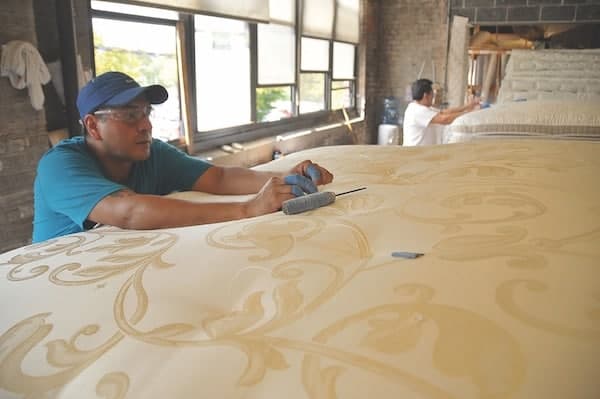
Shifman crafts all of its mattresses in the United States, employing more than 50 artisans, including Christian Hernandez (left) and Saul Andino.
When Mike Hammer, who currently is chief executive officer, bought Newark, New Jersey-based Shifman Mattress from the grandchildren of its founders, he had no idea of the work he had ahead of him. For starters, the average age of the factory workers was 70. The plant and equipment also were aging, and the company’s distribution network, while loyal, was ready for fresh products.
“The line had not been updated in many years,” Bill Hammer says. “A colorful, striped cover that did fine in the 1950s wasn’t going to sell in 1985. A lot of big changes needed to take place across the entire business — and that’s the tough mission my dad took on.”
Mike Hammer quickly began to put the company’s operations back on the right track. With the help of his wife, Eileen, and older sons Robert and Mark, who helped manage the office and plant activities for the first five years, Mike Hammer was able to go out on the road to expand the company’s retail base. Drawing on his two decades of industry experience with the former Simmons Bedding Co. (now Serta Simmons Bedding LLC) and Stearns & Foster, Mike Hammer shifted the company’s focus to higher-end furniture retailers, offering them exclusive products and a traffic-driving marketing program.
“We ran on fumes, but were able to triple business in the first four years,” Mike Hammer told BedTimes in a 2011 interview about the transition. That hands-on approach to the rebuilding process enabled the company to survive and eventually thrive, says Bill Hammer, who joined Shifman in 1994 and became president in 2008. “He did the heavy lifting to move the company forward, making sure the bills got paid but also finding ways to reinvest in the building, the equipment and our employees,” he says.
“The Shifman Difference”
Today, Shifman Mattress stands on solid ground with a steadily growing base of retailers and a well-regarded line of midpriced and higher-end mattresses and box springs. The company’s beds are distinguished by what the Hammers call “The Shifman Difference”: the generous use of cotton and other quality, natural materials for upholstery layers; a high level of craftsmanship, including a proprietary, hand-tufting technique on many models; two-sided construction for extended comfort and durability; and the use of eight-way, hand-tied box springs that conform to the natural contours of the body to enhance comfort.
Shifman’s line includes eight core collections. Although the company offers a few promotional sets retail priced from $799 to $999, the heart of the line starts with Quilted, a machine-quilted collection with as much as 47 pounds of natural cotton in the upholstery retail priced at $1,500 for a queen set. Also in this midpriced range are Metropolitan, a collection created exclusively for New York-based retailer Bloomingdale’s, and American Heritage. The American Heritage collection consists of nine hand-tufted beds with a choice of comfort levels in both pillow-top and tight-top designs. Introduced at the High Point Market in April 2018, the latest version of American Heritage was designed for large mattress retailers seeking a “range of mattresses offering premium features, as well as a higher average unit sale for increased profitability” to compete against the big-name brands, Bill Hammer says.
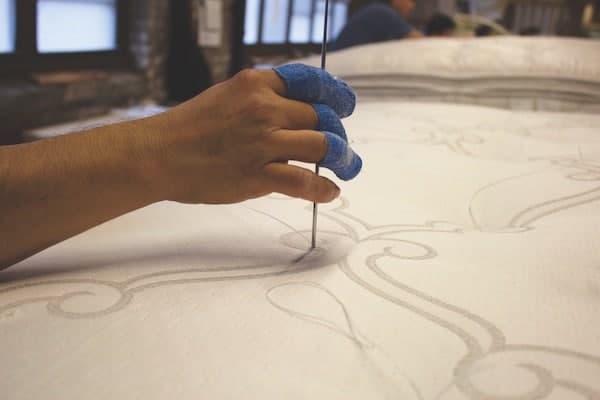
Shifman’s premium mattresses use the company’s Sanotuft technique, which produces a smooth, buttonless tuft.
Moving up in price points are Shifman’s next three collections — Modern Comfort, Pure Comfort and Shifman Vintage.
The Modern Comfort collection features individually wrapped coils, natural cotton and additional comfort layers of natural latex and wool in select models. The hand-tufted beds are designed to be compatible with platform or adjustable bases — a feature that is becoming increasingly important, Bill Hammer says. Shifman Mattress debuted its own adjustable base program, called PowerMotion, in 2016.
Pure Comfort, an eco-friendly offering, combines Talalay latex with frames made of sustainable forest lumber. And Shifman Vintage, which was upgraded at the High Point Market in October 2018, features lavish woven covers with fine tailoring. Mattresses contain as much as 83 pounds of natural cotton in upholstery layers and have an improved innerspring with added coils and foam-and-steel edge support.
At the top of Shifman’s line is the Masters collection. In addition to the company’s signature hand tufted, two-sided construction and quality box spring, the Masters group features touches such as 18-karat gold corner guards, foam-and-steel edge support, a heavy-duty innerspring with added coils, and luxury layers that include natural latex and cashmere.
For the past several years, the bulk of the company’s sales have been in retail price points from $2,000 to $6,500. “That’s where our biggest volume is,” Bill Hammer says, adding that the company manufactures some collections above that range that also do well, including Bloomingdale’s exclusive Grandeur group, with prices from $13,000 to $29,000. And offerings below $2,000 are important too, “because retailers always need quality products that they can promote and attract traffic with,” Bill Hammer says.
At recent markets, Shifman Mattress has been striving to modernize the look and feel of its collections across all price points. “We’re using more premium fabrics with a softer hand and plusher surfaces and upgrading the profile of our borders for a more tailored look,” Bill Hammer says. “The goal is to create a more modern-looking product while still maintaining our heritage of craftsmanship and quality materials.”
While the company will continue to look for other ways to keep its line in tune with changing consumer tastes, one product category that it won’t explore is boxed beds. “The nature of our product — combining thick layering with hand tufting — doesn’t lend itself to being compressed and squeezed into a small box,” Bill Hammer says. “But we will be working with our retailers more closely on e-commerce so that more consumers can shop for our line online and have the mattress delivered to their home with white-glove service.”
Bloomingdale’s already is selling Shifman bedding online, and Bill Hammer expects more brick-and-mortar stores will move in that direction.
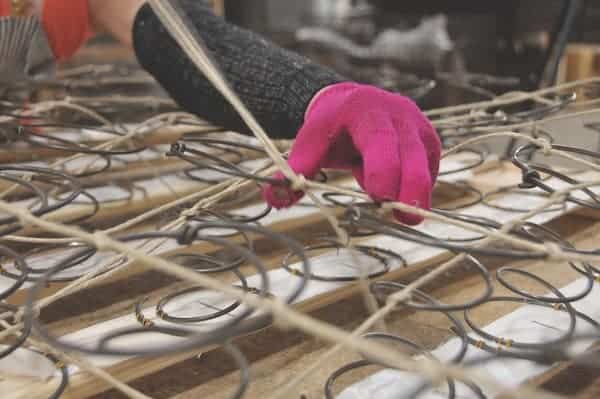
Eight-way, hand-tied box springs remain a hallmark of the Shifman line.
“The ways people shop and the ways things are sold are changing,” he says. “We want to do everything we can to support our retailers in bridging the gap that exists between brick-and-mortar stores and e-commerce.”
Creating a national presence
Along with continuing to upgrade its line, two other priorities for Shifman in 2019 are adding new customers and growing market share. To help expand its distribution, Shifman opened its first showroom in Las Vegas last year. The first two showings went so well for the company that it moved into a new permanent showroom in C-1554 of the World Market Center for this year’s winter market, Jan. 27-31.
“Exhibiting in Vegas has helped us add new stores in the West and it also has enabled us to expand our business in the East,” Bill Hammer says. “We’ve been missing some opportunities in High Point because some bedding buyers in the East — unless they also are part of the store’s furniture buying team — only attend the Las Vegas Market.”
Going forward, Shifman expects to continue showing at both markets. “We’ve been exhibiting in High Point for nearly 10 years and it continues to be an important venue for showcasing our brand,” he says. “But we also are very excited about our growing presence in Las Vegas. At each of the markets we’ve shown there, we’ve attracted a number of major retailers who have never tried a Shifman mattress. We’re exposing a whole new group to our brand, and they’re all telling us that they can’t believe the level of quality that we put into our beds.”
As it expands its base of retailers, Shifman is being careful to choose the right type of partners for its line and business model. The company currently sells to a mix of smaller family-owned furniture stores, regional furniture chains and national retailers.
“We want to do business with people we can work with over the long term — not just quarter to quarter,” Bill Hammer says. “Our line does best with retailers who focus on better-quality goods and offer high levels of service and customer satisfaction. We’re always looking for owners and managers that have integrity and want to establish strong partnerships.”
Shifman’s distribution historically has focused on a region stretching from Maine to Virginia, but in recent years, the company has steadily expanded, adding new stores in Atlanta, Chicago, Cleveland and Miami, as well as a number of markets west of the Mississippi, including Dallas, Denver, Houston, Phoenix, and locations in Southern and Northern California.
“Our long-term goal is to become a national brand,” Bill Hammer says. “We want consumers in all major markets to have the opportunity to choose a Shifman mattress if they’d like to. But we’re not in any hurry. Although we’ve made a lot of progress in building out our store network in recent years, there still is a lot of space on the map where we’re not represented.”
Forging strong partnerships
When Shifman Mattress enters a new city or region, it typically teams up with a few select stores in the market, offering exclusive distribution and hands-on service. “We’re not aiming to sell thousands of units,” Bill Hammer says. “We want our retailers to be successful, and that means providing them with a high-value, quality product with an attractive profit margin that’s not going to be undercut by someone else down the street.”
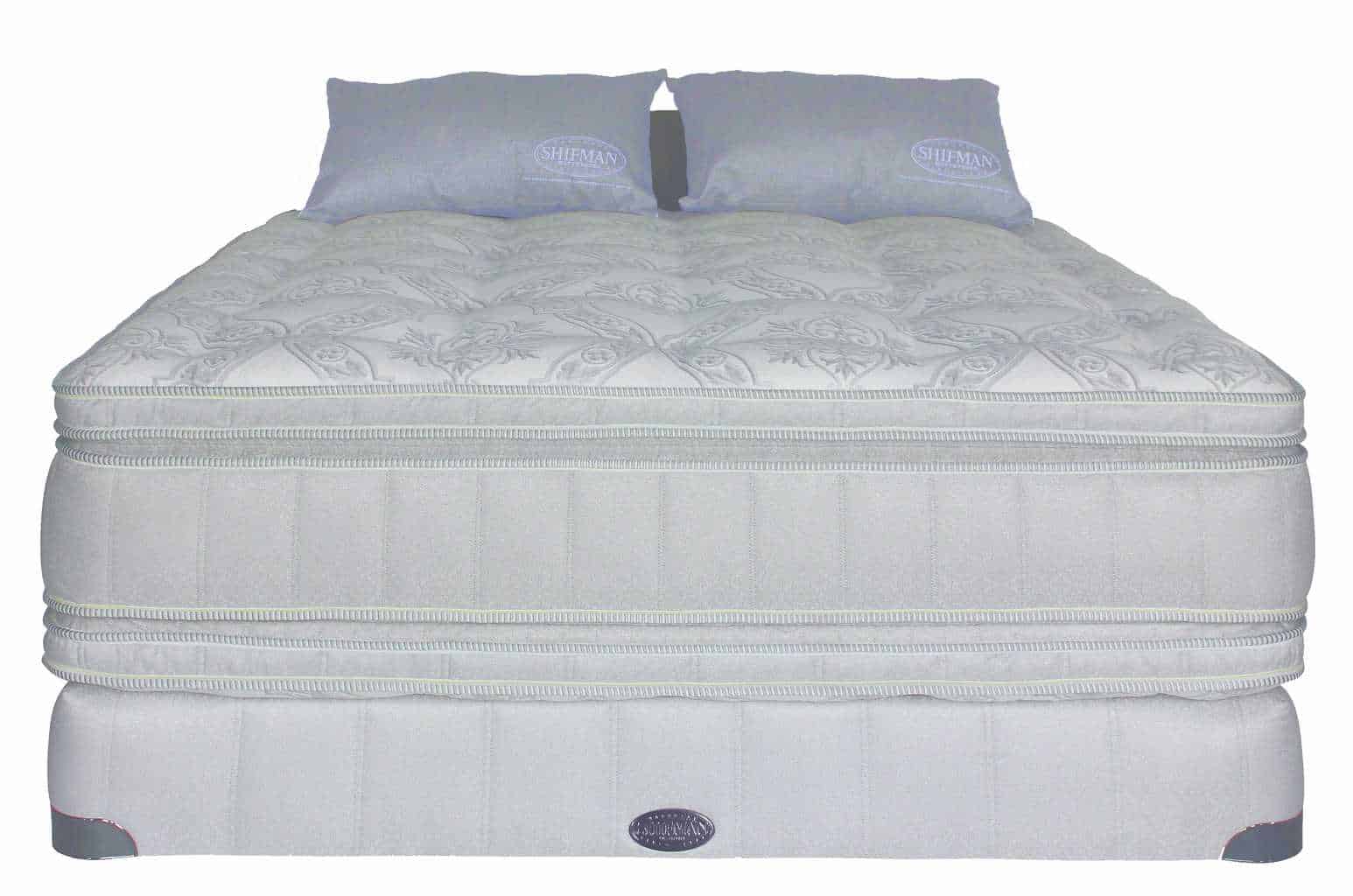
Mattresses in Shifman’s Masters collection feature as much as 83 pounds of natural cotton in upholstery layers, plus natural latex and cashmere.
Two good examples of the type of long-term relationships Shifman has forged with its retailers are Benjamin T. Moyer Furniture in Sunbury, Pennsylvania, and the Bloomingdale’s department store chain. Benjamin T. Moyer has been carrying the Shifman line for 83 years and currently features 14 Shifman sets in its mattress gallery. Bloomingdale’s has been selling Shifman bedding for more than 30 years.
“We’re very proud of our entire retail community,” Bill Hammer says. “The strength of ‘The Shifman Difference’ and the support of devoted retailers like these is a winning combination for all parties involved.”
To be successful with the Shifman line, a retailer needs to carry “an appropriate assortment of models with a variety of price points and comfort levels,” he says. “Not everyone wants the same level of firmness and support, so it’s important that a store offer a range of choices so the consumer can find the best fit for their needs.”
Shifman generally asks that a retailer show a minimum sampling of its bed sets on their floor and present them in a gallery atmosphere if possible, so that all of the company’s models are in one place. In addition, Shifman expects its retailers to maintain stock of best-sellers to ensure consumer demand is met quickly. The company warehouses products at its New Jersey headquarters and locations in key markets.
“We are a true partner to our retailers,” Bill Hammer says. “We do everything we can to support their efforts, from developing effective marketing and advertising programs to providing consistently high-quality products backed by dependable, on-time delivery.”
Shifman’s marketing tools include a recently updated gallery program and a wide assortment of point-of-purchase and co-op multimedia advertising materials, such as print ads. The company launched an improved, mobile-friendly website in 2017 with upgraded visuals, enhanced content and improved navigation. The website’s Find a Retailer tool makes it easier for consumers to locate a dealer in their area and also provides helpful information such as store address, hours of operation and driving directions.
The website provides retailers — and their customers — with access to product descriptions and other details “like never before,” Bill Hammer says. The site includes mattress care information, a Pillow Talk blog with insights about the value of quality sleep, a 360-degree showroom tour and video links.
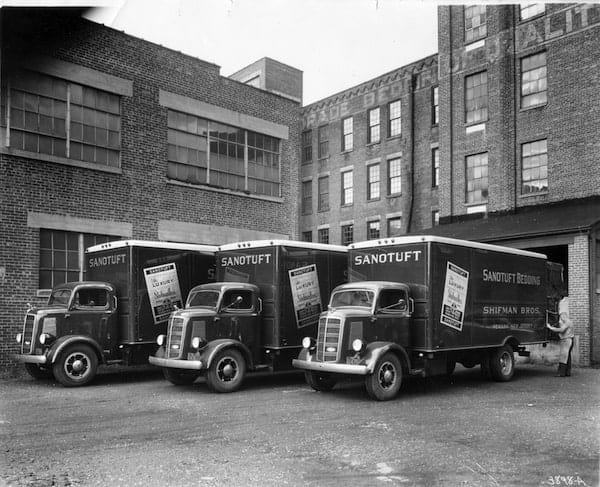
Shifman delivery trucks get set to deliver another load of mattresses in this vintage photo from the company’s archives.
This year, Shifman Mattress will continue to build its visibility online by investing in more digital advertising and social media campaigns. The company began a digital advertising program about three years ago and, based on the success it has had with Facebook and keyword search, it will invest even more in the coming year.
“Our efforts have really paid off for some stores, while others haven’t seen much impact yet,” Bill Hammer says. “We’ll continue to fine-tune this program to make sure we’re spending our dollars in a way that generates the best results for everybody.”
In addition to investing more in digital advertising, Shifman will look for other creative ways to get the word out about its products to consumers. One program it had success with in 2016 and 2017 was a promotional partnership with New York Knicks star Kristaps Porzingis. Acting as brand ambassador, Porzingis attended a special event held at Bloomingdale’s flagship store in New York, signing autographs for fans. As part of the deal, Shifman created an Athletic King mattress set large enough to accommodate Porzingis’ 7’2” frame.
“We learned a lot from this program,” Bill Hammer says. “It generated good results, but the focus was much too local. Next time, we’ll look for an opportunity that will enable us to promote the brand across a much broader range of markets.”
Building on core strengths
As it strengthens its brand, Shifman Mattress will emphasize one key theme, Bill Hammer says: “The unwavering commitment our craftspeople make to manufacture the finest handmade mattresses in the world.”
While mattress manufacturing has changed over the years, Shifman’s basic approach to making beds has remained the same. “We’re focused on producing luxury, two-sided mattresses hand-crafted with natural cotton on eight-way, hand-tied upholstery coil box springs,” he says. “It’s a deep tradition of quality that we plan to continue for many years to come.”
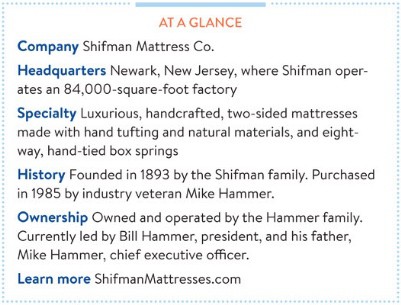
While Shifman has invested heavily in production machinery and systems over the years, the company’s most valuable asset continues to be the skill of its workforce. It generally takes nearly two dozen skilled craftspeople eight to 12 hours of painstaking work to make a typical Shifman mattress. Using the exclusive Sanotuft technique, these craftspeople hand tuft the various layers to create the finished mattress. Each box spring is hand tied with upholstery grade coils and imported Italian twine.
Like its retailer base, Shifman’s 70-person workforce is known for its deep loyalty. It’s not unusual for an employee to work an entire career at the company. For instance, in 2017, two sisters — Albina Lourenco and Margarida Pereira — were honored for their 30 years of service as seamstresses. The pair joined the company in 1986, shortly after its purchase by the Hammer family. “We needed people who were willing to work and apply themselves,” Mike Hammer said at an event recognizing their service. “Margarida and Albina are great workers, and they gave me the inspiration to keep going even when it was difficult.”
Recognizing that “seeing is believing,” Shifman encourages all of its dealers and their retail sales associates to travel to the factory for a tour. By visiting, retailers and RSAs can get a better sense of the company’s manufacturing techniques and its culture, which Mike Hammer established around the core principles of integrity, quality and customer service.
“What we are doing here is very unique,” Bill Hammer says. “Most companies today are focused on how they can make their products quicker and less expensively, so they can make more money for their shareholders. We’re the opposite. We want to take our time so that we can make the best product possible. We can afford to do that because we’re family owned rather than responsible to a group of shareholders or private equity investors.”
When a retailer or an RSA sees Shifman’s craftspeople in action, “they get an immediate understanding of what makes our beds so special,” Bill Hammer adds. “They then take that enthusiasm back to their stores, where they can pass it on to their customers and get them excited about our beds, too.”




